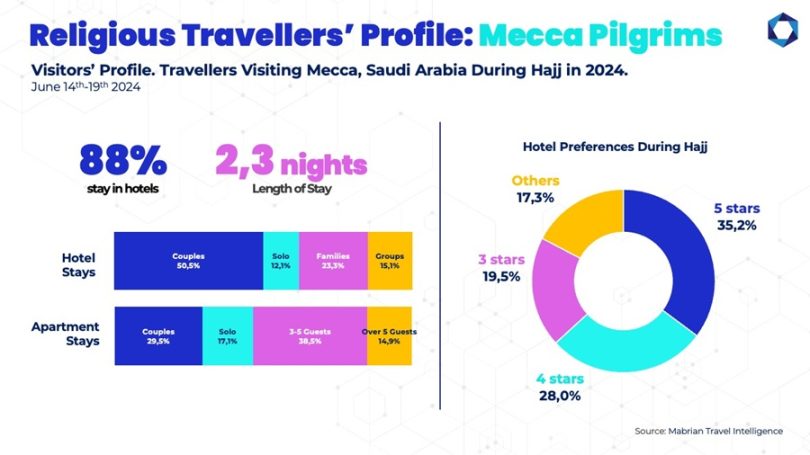Mabrian’s latest data reveals the growing travel impact of Hajj 2025, with over 151.6 million flight seats scheduled to Mecca, in the Kingdom of Saudi Arabia — a 1.2 million seats increase compared to 2024 festivities. Most top source markets show increased air capacity, and hotels remain the dominant lodging choice, although apartments show rising demand among larger groups.
As one of the largest annual gatherings in the world, Hajj 2025 is expected to attract millions of Muslim pilgrims to Mecca, Saudi Arabia, from June 4th to June 8th. In anticipation of this sacred journey, Mabrian, the global travel intelligence company part of The Data Appeal Company – Almawave Group, reveals new insights into the global travel impact of the event—shedding light on air connectivity, travel patterns, accommodation choices, and visitor profiles.
The data helps quantify the significance of this religious pilgrimage as a major travel and tourism phenomenon.
- Over 151.6 million airline seats are scheduled to Mecca for Hajj 2025: Scheduled air availability to travel between June 1st and 9th, increase by 3.2% year-over-year, and by +1,2 Million (+0.8%) compared to last year’s Hajj, which took place from June 14th to 19th.
- Most top 10 source markets show increased air connectivity, with Brazil (+8.2%) and Germany (+3.4%) among the highest: Compared to Hajj 2024, nearly all of the top 10 source markets by air connectivity have shown slight increases: the United States (+0.1%), India (+0.6%), Japan (+3.2%), Spain (+2.7%), United Kingdom (+1%), Germany (+3.4%), Türkiye (+4%), Italy (+0.6%), and Brazil (+8.2%). The only exception is China, which saw a 3% decline in seat availability.
- Among countries with large Muslim population, Malaysia (+12.6%) and Egypt (+8.5%) lead in increased seat availability: Among countries with significant Muslim populations, air capacity changes vary. Compared to 2024, Indonesia shows a decline of -8.6%, while Malaysia (+12.6%), Egypt (+8.5%), Ethiopia (+5.1%), and Pakistan (+4.8%) all show positive growth in seat availability.
- Average stays range from 1.8 nights (domestic) to 3.1 nights (international), with most travellers choosing hotels (88%): The average length of stay is 2.3 nights, with longer durations for international visitors—Egyptians (3.1 nights), Malaysians (2.8), Indonesians (3.1), and British travellers (2.5), whereas domestic visitors average shorter stays of 1.8 nights. In terms of lodging, 88% of visitors stay in hotels, while 12% opt for apartments or alternative accommodations. Among hotel guests, 35.2% stay in 5-star hotels, 28% in 4-star, 19.5% in 3-star, and 17.3% use alternative accommodation.
- Hotel guests are mostly couples (50.5%), while apartment users prefer group accommodations: Hotel guests in Mecca during Hajj are mainly couples (50.5%), with 22.3% being families, 15.1% groups of friends or extended families, and 12.1% solo travellers. Apartment users show different behaviours; in fact, 52.1% book properties for 3–5 guests, 20.6% choose larger accommodations for over 5 people, 25% book for 2 people, and 2.3% are solo travellers.
“Hajj is not only a profound spiritual journey, but also a major global travel event,” says Carlos Cendra, Partner and Director of Marketing & Communications at Mabrian. “Our data highlights how destinations, airlines, and accommodation providers may adapt to the evolving needs of religious travellers, a key and growing segment globally.”







